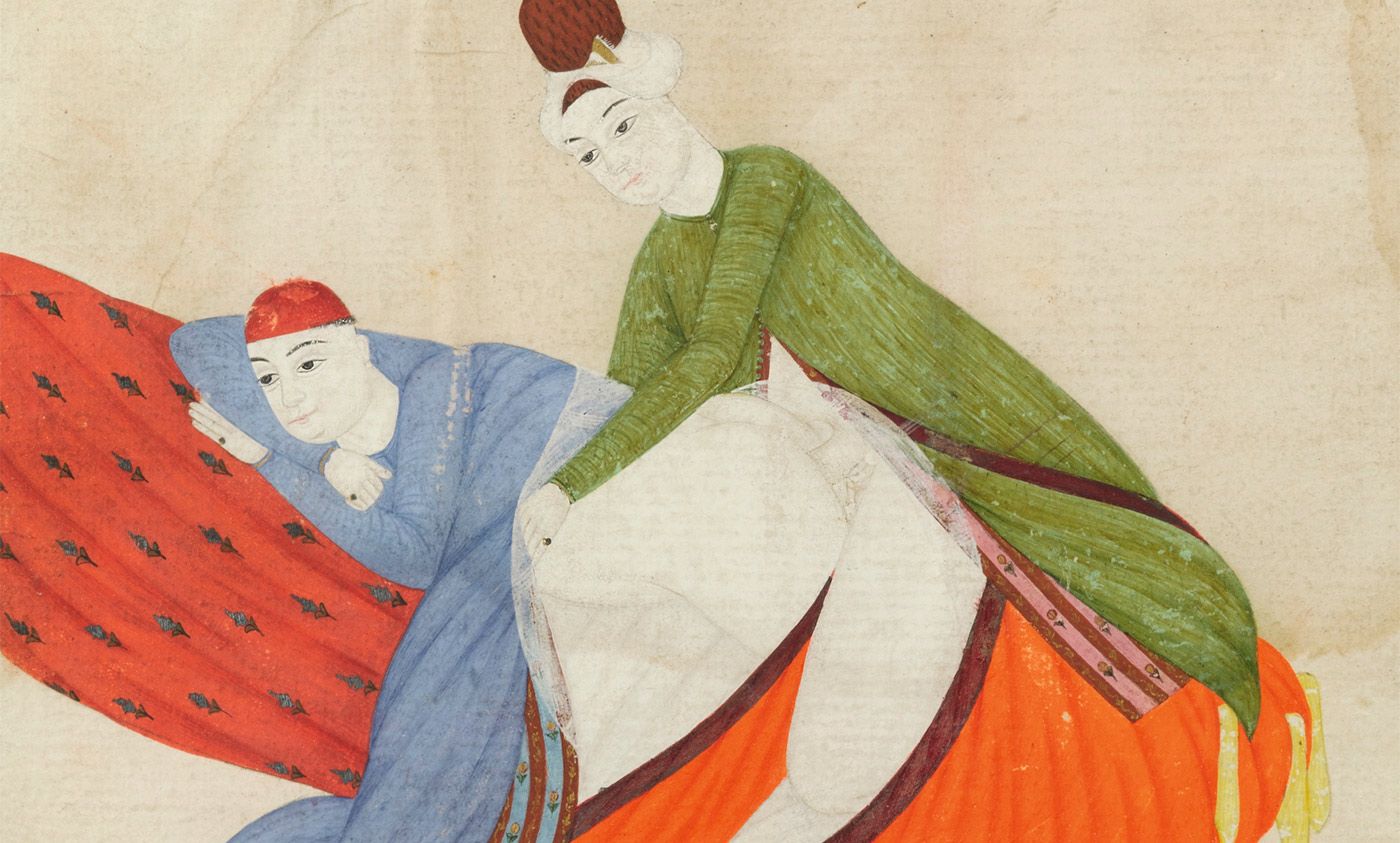by IRVIN CEMIL SCHICK
 Turkey, probably Istanbul, 18th century. An erotic scene, ascribed to Abdullah Bukhari. 1743 CE. PHOTO/courtesy Sothebys
Turkey, probably Istanbul, 18th century. An erotic scene, ascribed to Abdullah Bukhari. 1743 CE. PHOTO/courtesy Sothebys
History might be the best antidote to the unthinking, and pernicious, naturalisation of cisgender identity and heterosexuality. When confronted with the fact that, for most of history, people simply did not conceive of human sexuality in fixed and dimorphic terms, it becomes much easier to imagine a liberating, pluralist future.
In ancient Greece, the semi-institutionalised relationships between erastês and erômenos (ie, adult men and young boys) offer an example of sexual mores that differ from those of the present. When scholars say that ‘homosexuality’ is a modern construct, they do not, of course, mean that people in the past did not engage in same-sex romantic or erotic relations. They mean, rather, that same-sex relations were viewed in pre-modern times as merely a predilection or practice, whereas during the 19th century they came to be considered an innate nature, an identity.
The German term Homosexualität was coined only around 1868 by the Austro-Hungarian author and journalist Károly Mária Kertbeny (formerly Karl-Maria Benkert). This fact raises the question of how people might have conceptualised what we now think of as homosexuality before the word existed. This is why, as Robert Beachy has suggested, we should speak instead of the ‘invention’ of homosexuality in late 19th-century Europe. In this context, the title of intellectual historian Khaled el-Rouayheb’s book on same-sex relations avant la lettre is significant – Before Homosexuality in the Arab-Islamic World, 1500-1800 (2005).
In the Ottoman Empire, prior to the advent of Western-influenced heteronormativity in the late-19th century, sexual mores presented a very different picture. A closer look at the Ottoman experience of sexuality is instructive. With the Ottomanists Helga Anetshofer and ?pek Hüner-Cora at the University of Chicago, I have been combing through five centuries of Ottoman literary works searching for sexual terminology. The results of this research – currently more than 600 words – teach us, if not necessarily how people actually lived, then at the very least how they thought about sex throughout the Ottoman-speaking world, principally the territory of modern Turkey and its immediate neighbours.
Although there is no doubt that the vocabulary extracted thus far is not exhaustive, some clear patterns have emerged. In particular, it indicates that one can speak of three genders and two sexualities. First, rather than a male/female dichotomy, sources clearly view men, women and boys as three distinct genders. Indeed, boys are not deemed ‘feminine’, nor are they mere substitutes for women; while they do share certain characteristics with them, such as the absence of facial hair, boys are clearly considered a separate gender. Furthermore, since they grow up to be men, gender is fluid and, in a sense, every adult man is ‘transgender’, having once been a boy.
Second, sources suggest that there are two distinct sexualities. But rather than a hetero/homosexual dichotomy, the two sexualities are defined by penetrating and being penetrated. For a man who penetrates, whom he penetrates was considered to be of little consequence and primarily a matter of personal taste. It is indeed significant that the words used for an ‘active’ man’s sexual orientation were quite devoid of value judgment: for example, matlab (demands, wishes, desires), me?reb (temperament, character, disposition), mezheb (manner, mode of conduct, sect), tarîk (path, way, method, manner), and tercîh (choice, preference). Being objects of penetration, boys and women were considered not quite as noble as men. As sexual partners, however, neither women nor boys were held to be more estimable than the other. In short, instead of a well-defined sexual identity, literature suggests that, in Ottoman society, a man’s choice of sexual partner was viewed purely as a matter of taste, not unlike a person today might prefer wine over beer or vice versa.
Aeon for more
